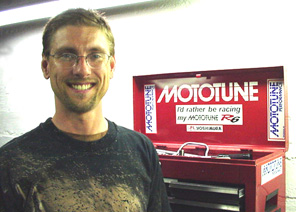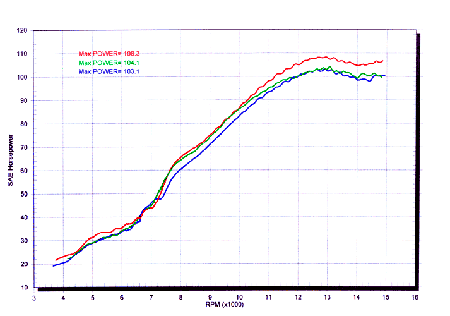
![]()
"The Scientifical ~
Mystical One"
|
|
| Engine Work Hey MotoMan: I'm a racer in WMRRA & OMRRA [Washington & Oregon, USA] racing organizations. I am one of the top competitors in the northwest, but had been plagued with under horsepower machines. I have watched [Mototune] competitors such as Alan Schmidt, Dave Cook kick my ass down the straight and quite frankly I am sick of it. For the 2002 season, I want to be able to be competitive down the straight not just the corners. I have seen what your motors have done out on the track, so there is no question on who I would like to use to build my motor. I just need you to answer a few questions. How much does it cost to have you build a supersport motor? How much does it cost to ship a motor? What kind of time frame do you need? How much horsepower are you getting out of the new GSXR-750's. If I purchase another bike, and have you build two motors for me--is there a price savings? Information ? ~ Mark Hi Mark !!
Thanks for the awesome testimonial for Mototune ! Hi Corey ! Thanks for the high rating
!! Thanks,
|
Mototune USA Fans !!
This is just one part of an ongoing tech series available for free to Power News
Subscribers.
I'd like to invite you to become a Power News Subscriber !! Upon signing up
you'll immediately receive the secret links with photos and instructions on how to high velocity port your own cylinder
head. There are also lots more articles that will give you new insights into
improving modern
high performance engine technology.
It's free, just fill in your e-mail in the sign up form at the bottom of
this page !!
Sincerely,
Pat McGivern
~MotoMan
Misinformation
756,220 to 1 !!
At the time this article was written in late
2001, when you typed the words "Intake
Porting" into the Alta Vista search engine,
you'd find an incredible
756,220 pages related to this topic !!
Every one of those pages will tell you the exact
opposite of what
I'm going to teach you today.
The odds are overwhelmingly against the MotoMan on this one:
That's over
Three-Quarters of a Million against 1 !!
(That's not including another
'zillion' books, magazines and other tuners...)
| The Honda Hawk Experiment In January of 1992, I first studied the effects of porting on my own race bikes, and made a huge discovery. It worked so well, that after a summer of working on other people's bikes, I could show up at the local racetrack in August with no practice and easily win races. At Daytona in 1993, I was able to test my idea against the best in America. Like every fast Hawk rider at the time I had the 700 cc (3 mm over) piston kit, a pipe and the popular racing cams. My carburetors and everything else inside the engine was stock, except for my secret porting trick. The competition ?? The top racers had their Hawks built by a company called Two Brothers which, based on their huge success with Hawks, went on to become a semi factory Honda race team. Gridded on the very last row, I came out of turn one in last place out of 43 riders !! (I always freaked out on starts) Once the tires warmed up, I realized I could easily out accelerate the Two Brothers bikes as well as everyone else in the race. At one point, without using the draft, I passed 11 of my fellow Hawk riders at once on the fastest part of the banking. In the short 4 lap race, I passed 38 riders to take 5th place Expert in my first time at the track. Since then I've ported about 100 heads from every major brand and type of 4 stroke engine. The result has been shattered lap records, countless USA roadracing championships, and another 2 in Europe. On the street, I've built a few real "sleepers" in the USA, and created a genuine "street legend" in the Dominican Republic !! There was no way I could hide the evidence of this porting technique, and it's amazing results, so I thought for sure that it would only be a matter of months before everyone else caught on. I was convinced that the advantage of my new "secret weapon" would be over by early 1994. It's been exactly 10 years since my discovery, and with very few exceptions, no one else has gotten it. How could that be ?? Motor sports are supposed to be so ultra competitive that no one can hold an advantage for long. With the vast manpower & financial resources of the big racing teams, how could 1 guy from Wisconsin hold onto all the chips for 10 years?? It made me realize that there are similar situations like this in every endeavor all over the world. That's why I came up with the motto "get past the cutting edge". I'm here to tell you that the "cutting edge" is artificial, and whatever you do, you can beat the best. No one's unbeatable at anything, once you truly understand the power of thinking outside of the box. I've realized that the answer to how easily I was able to protect my "secret" ... really lies in an understanding of human nature. The information I'm going to share with you will certainly change the face of engine performance & technology. I also sincerely hope it will inspire you to look deeper into the ways that we "automatically think" ... ... without ever actually thinking. |
The Magical Myth of Flowbench - Porting
 |
Once upon a time... The flowbench is a machine that measures the airflow through the ports by sucking air thru like a vacuum cleaner. The vacuum gauges on the bench actually measure the resistance to the flow thru the ports, and the result is converted into CFM. That means "how many Cubic Feet of air will flow through the port per Minute." |
| Anyone who buys a flowbench and
a dremel tool is "qualified" to flowbench - port heads. The Superflow flowbench owner's manual
says that: " For every 1 CFM of increase in intake flow, you'll gain .43 horsepower. " If you want more water to flow through a pipe, just make the pipe bigger. There's something wrong with this though. |
|
|
It's easy to understand why so many
people automatically think Flowbench - Porting, or "more is better"
is a way to improve power. |
|
Okay,
Let's examine it a little closer !! |
,
|
|
|
Uh - Oh ... |
||
|
|
It's true !! When you stop to think about it, a flowbench only measures the efficiency of the "suction phase". That's not the right thing to measure. Why ?? Because, it doesn't matter how well the cylinder is filled at that point in the intake cycle ! |
|
| What ... that sounds crazy
!!! It's 100% true ... it's simply a matter of the sequence of events ! The success of the last event, the charging phase, determines the success of the entire intake process. What happens when a low velocity port fills the cylinder really well, but too early ?? The result is a slower intake charge that stops flowing into the cylinder. Then some of the charge gets pushed back out of the cylinder and into the port as the piston returns up the bore during the intake charging phase. The gain in flow doesn't offset the loss in port velocity. .
So in the final result, the first 2 phases don't matter if the 3rd phase is unsuccessful !! The
total intake volume that will be burned is determined by the amount that
remains in the cylinders
after the
intake valves close. That means that an early gain during the suction phase can
be easily lost during the charging phase. And, if the intake charge returns back into the port during the piston's upstroke, the result is
going to be a
net loss !! |
|
Remember |
"Why hasn't anyone thought of this before ?!?!" One reason is that people only think of
"Scientists" as
scientists. Everyone can and should be a scientist !! That means you !! |
|
What happens when
we apply the scientific method |
|
|
|
-
Stock Ports 103.1 HP - 20% Smaller Ports 104.1 HP - 30% Smaller Ports 108.3 HP !! 
Click Here For The Full Size Version |
|
How do High Velocity Ports work on the racetrack ?? " Incredible !! "
600 Lap Record Smashed on
a Borrowed R6 !! |
||||
|
High Velocity Intake
Porting
|
Derek Shoeberle Powers Through Blackhawk Farms Raceway's
Notoriously Bumpy Turn 4.
|
|||
What if your head's already been flow bench ported ??
|
CBR 600F3 |
Flow
Bench Porting usually costs |
Remember:
More Flow Doesn't Always Equal More Power !!
But
Less Velocity Usually Equals Less Power !!!
How does
Misinformation
go unchallenged ??
1) Failure to use the scientific method !!
2) A lack of critical thinking about existing information !!
3) Follow the leader mentality !!
4) Fear of being different !!
5) Blind trust in books and magazines !!
6) Mass marketing !!
7) Because changing the way you think is scary !!
8) All of the above !!
(Of course, the correct answer is #8)

|
" It's Time Somebody Did Something About Bread !! " |
|
| Did you know:
1) More than 98 percent of convicted
criminals are bread eaters ! 3) In the 19th century, when virtually
all bread was baked in the home, the average
life expectancy was less than 55 years; infant mortality rates were
unacceptably high; many women died in childbirth; and diseases such as
typhoid, scarlet fever, smallpox and influenza ravaged entire nations ! 4) Statistics show that more than 75 % of violent crimes are
committed within 24 hours of eating bread ! 5) Bread
is made from a substance called "dough." Researchers have proven that
as little as one pound of dough can choke a large animal like a horse. The
average person eats more bread than that in
one month ! 6) Bread
is known to be extremely addictive. Subjects deprived of bread
and given only water, actually begged for bread
after just two days ! 7) Bread
is a "gateway" food item, which usually leads to such items as
butter, jam, peanut butter and even ... bacon ! 8) Bread
has been proven to kill. Scientists have now uncovered alarming evidence that 100%
of the people who eat bread will eventually
die ! 9) Unattended newborn babies can choke
on bread ! 10) Bread
is baked at temperatures as high as 425 degrees Fahrenheit ! Don't
laugh...that kind of heat can kill a full grown adult in less than five
minutes. 11) 96 % of cancer victims eventually admit
that they've eaten bread ! (Not Critical Thinkers Like You !!) |
|
Misinformation |
Don't Miss The Next Issue:
Learn How To High Velocity Port
Your Own Cylinder Head !!
|
Learn How to Do it Yourself:
Smaller Intake Ports Gain 7 % More Power
|